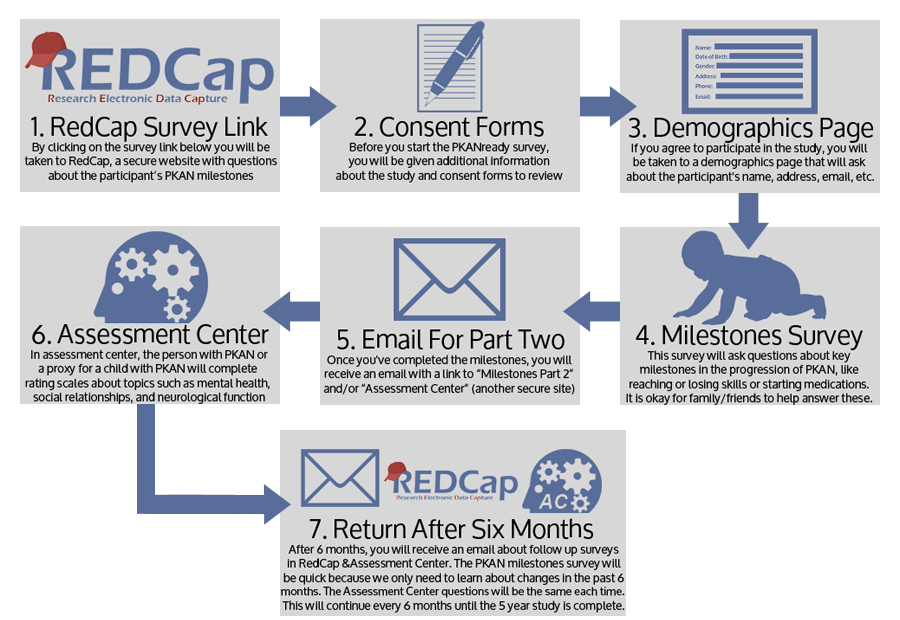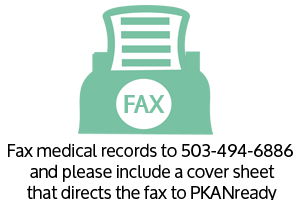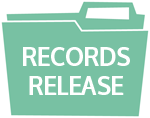The NBIA Research Group at OHSU has developed a new five-year clinical study called PKANready. The purpose of this study is to help us better understand the natural history of PKAN, meaning how symptoms appear and change over time. By studying individuals with PKAN, we also hope to identify disease markers that can be used in future clinical trials. A disease marker is any symptom or measurement that happens reliably in a disease, changes predictably with disease progression, and becomes “better” with successful treatment. A disease marker could be an MRI finding, a protein level in the blood, or a rating scale to measure symptoms or function. Natural history studies provide data that serve as the foundation for future drug trials.

Thank you for your interest in PKANready!
To Participate in PKANready You Will Need:

1.) Fluency in the English language (the study participant and any guardian or support person who is helping them should be fluent in English.)

2.) A computer with Internet access

3.) An email account (please make sure you select an email that you check regularly and will not change for the next few years because we will be sending links to the surveys and reminders through this email address)

4.) A parent or guardian to help you if you are age 0-17 years (it is ok to have someone help you if you are 18 or older, too).

5.) If you are 18 years or older, you must be able to answer basic questions about your emotional, social and cognitive well-being (examples are provided in the consent form)
Flowchart of the PKANready Study
The image below shows a flowchart to give you an idea of the steps involved in this study. Don’t worry, most of the process is automated, and we will send you reminders if you leave a survey incomplete for too long or forget to do the 6-month follow up surveys.

Participant Categories
Some individuals with PKAN will be able to complete survey questions themselves, with help as needed with reading and/or typing. Others will need a “proxy” (parent/guardian) to answer the Assessment Center questions by providing their opinions about the individual with PKAN. Please read the descriptions below to decide which category best fits your situation (you will be provided with these descriptions again once you start the survey).
The categories are:
1.) Adults (18+ years old) can complete the survey themselves with help as needed. This help includes navigating through the website, reading and typing, but the participant with PKAN should provide answers to the rating scale questions (at this time, adults who are cognitively impaired and cannot provide consent or answer basic questions cannot participate).
2.) Children ages 0-7 will require a proxy to complete all the rating scales. The proxy should be a parent or guardian who helps care for the individual with PKAN and knows them well. The proxy should be the same person for each study visit for the entire duration of the study, since the proxy will be entering his/her opinions about the research participant.
3.) Children ages 8-17 can complete the rating scales themselves with help from an adult as needed. This help includes navigating through the website, reading and typing, but the participant with PKAN should provide answers to the rating scale questions.
4.) Children 8-17 who have cognitive impairments or other limitations that make it impossible to answer basic questions will also need to have a proxy. The proxy should be a parent or guardian who helps care for the individual with PKAN and knows him/her well. The proxy should be the same person for each study visit for the entire duration of the study, since the proxy will be entering his/her opinions about the research participant.
It can be hard to decide whether an 8-17 year-old will be able to answer the questions independently. Here are some sample questions:
In the past 7 days, I felt scared
a. Never
b. Almost never
c. Sometimes
d. Often
e. Almost always
In the past 7 days, I could stand up by myself
a. With no trouble
b. With a little trouble
c. With some trouble
d. With a lot of trouble
e. Not able to do
5.) The guardian of a deceased child age 0-17 who had PKAN can act as a proxy to complete all the rating scales. The proxy should be a parent or guardian who helped care for the individual with PKAN and knew them well.
Important Things to Remember:
1.) We need to confirm the PKAN diagnosis of each study participant. The best way to do this is with a copy of the genetic testing results. If you think our research team already has your results, please verify this by emailing an inquiry to us at PKANready@ohsu.edu. If you don’t have the results at home and we don’t have them either, you can request a copy from your doctor.
2.) We will need to confirm the dates when certain milestones were reached by using the participant’s medical records.
3.) You can download a medical records release form that will allow us to request and review the participant’s records by clicking on the link below. In the blue highlighted portion, please fill out the name and address of the physician’s office/institution where the medical records for the individual with PKAN reside. In the yellow highlighted portion, please fill out the name/information for the individual with PKAN.
4.) Please send the participant’s medical records, including the PKAN genetic testing results to us by one of these methods:



Getting Started
We recommend gathering together all the relevant medical records before starting the survey. If you realize you need to find something or run out of time, you can pause the survey and come back later.
Once you are ready to review the consent forms and/or start the study, please click on the image below:
Copyright © 2014 by NBIAcure.org. All rights reserved.

